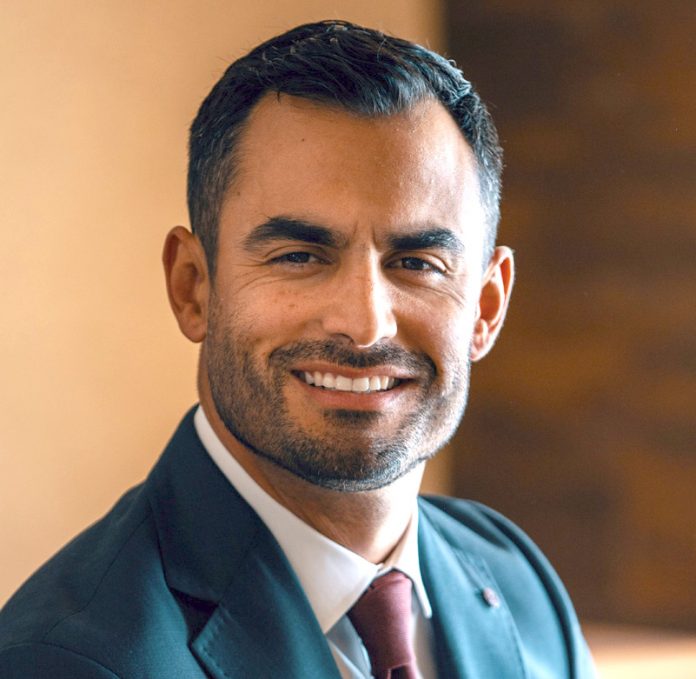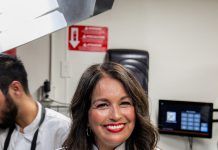Marco Contreras, 36 (R)
Where do you live in the district and for how long?
Chula Vista, and have lived in the district for 7 years.
Tell us a little about yourself and why you are running for the 79th assembly.
I have lived the American Dream and know that there is no other place on the globe that would have allowed me to accomplish all that I have in life. I have experienced the goodness of our country, and our city, and I want you and your kids to have the same experience. I was born in San Diego, but grew up across the border in Tijuana, Mexico and after crossing the border legally every day to go to school, I became the first in my family to graduate from college.
After a memorable night, digging for change in the couch so we could buy groceries to share with our toddler, my wife and I decided to start my own business. I looked to my own mother, who set an example by taking a small loan from her family and building a successful business in Mexico. In 2013, we launched Rancho Customs Brokers which has grown exponentially in the last 8 years and opened the door to broader business and job opportunities within the customs and logistics industry.
All of these experiences are why I fell in love with this great country and all that it stands for. While we see our neighbors falling into the trap of divisiveness, we know there is a better way forward – at the root and foundation of our country there was and there still is unity. I’m running because I believe our community needs a new and effective approach to leadership. I want to be a voice in our government that stands for providing safety to our cities, a voice that stands for a financially sound approach to government, and a voice that stands for preserving the future and potential of our children by putting education first. I’m running to serve our community by fighting to protect our rights and freedom to pursue life, liberty, and happiness. I believe there is greatness on the inside of every human being, and it is the job of every elected official to vote for policies that will help each person fulfill their own American Dream.
What do you believe are District 79’s current challenges and why? What would you do to address them?
Our district has been at a disadvantage economically for many years. Although only 22,700 of residents aged 25 to 64 are counted as unemployed, another 140,000 are not counted as part of the labor force. That means the job opportunities that could come to the region won’t necessarily lead to more jobs in the 79th. The economic recovery we need can only come from becoming a pro-business community, a pro-business state, by lowering taxation and unnecessary regulation, and providing grants to small businesses to facilitate more growth, more jobs. Being pro-business isn’t about helping the rich. Being pro-business is pro-jobs, and our district desperately needs a pro-jobs representative in the state legislature.
The COVID-19 pandemic has shown health, social, economic and digital disparities, especially within marginalized communities of color. What can propose to help these communities?
Our most urgent challenge is the unacceptable disparity in the vaccination rates of District 79’s residents. As of this week, out of 655,000 people vaccinated in San Diego County, 48% are white, 17% are Latino, 11% are Asian-American, and only 2.3% of the black population is vaccinated. Clearly, vaccines aren’t yet getting to the poorest black and Latino neighborhoods in our district. To address this, the state and county should have been working with local church groups to either establish pop-up vaccination sites in places familiar to those in the community or at least run workshops showing residents how to sign up for the vaccines, what they’ll need to prove they’re eligible, and how to follow-through with a second dose if necessary. That is why I have teamed up with pastors in my community to put on a Vaccine Connector Workshop to help residents who might not have the time or patience to deal with an online system by themselves, to show them how to make an appointment, which documents they’ll need to prove they’re eligible, how to confirm an appointment for their second dose, and any other troubles they might face. For our communities hit so hard by this pandemic, it’s time to do everything we can to make it right, save their lives, and help get us all back to a safe normal as quickly as possible.
With the COVID-19 pandemic, what negative impacts has it had in this district and how can you help at the state level?
The coronavirus pandemic took us all by surprise. 2020 was a hard year for everyone, and it put many people out of a job. After a year out of work, students and teachers out of the classroom, we cannot let this year be a repeat of the last. My first priority is safely reopening California by following the science that tells us students and teachers can safely return to in-classroom instruction and businesses can operate safely again. My first act as a member of the California State Assembly will be to team up with current Assembly members that have been fighting to open California again. We need to pass a bill with that kind of language because it will send the most powerful signal of all California is ready to reopen and lead the country in job creation, not unemployment.
Where to you stand on health insurance for all Californians and why?
All Californians should have access to quality healthcare and affordable health insurance. That was the goal of the Affordable Care Act but unfortunately, despite helping more than 5 million Californians get health insurance through an expansion of Medicaid or subsidies under Covered California, the unintended consequence has been sharply rising premiums in both the employer-provided and individual marketplaces for health insurance. What’s needed now is more competition, including out of state providers, less regulated health care markets, and more price transparency to drive down costs so more consumers have access to affordable health insurance that best suits them. Getting the government more involved will only increase costs and decrease quality at this point. It’s time we understand more government is not the solution to our problems, government is the problem, we need to allow the private sector to do what they do best. In addition, provide guardrails so that the least fortunate have access to healthcare.
What do you believe are the most underserved communities in the District and What kind of policies are needed to improve their daily lives?
The most underserved communities in the district are the poorest black and Latino communities that have been at an economic, healthcare, and education disadvantage for decades. The best policies to improve these communities are those that give power to the individual, not just the government. I know what it’s like to struggle, to be broke, to ask your mom for help at the end of a month, but I also know funding didn’t make a difference. Only when I had the vision, and the determination, to start my own business and earn more than just a living did my life begin to change. What our district needs is vision, leadership, to bring more opportunities within their reach. Improve public schools by focusing on innovative approaches to reward and incentivize teachers to perform at the highest level. Incentivize businesses to invest in our district, in career technical education, and bilingual education for apprentices and skilled laborers. We need leaders who believe in the American Dream, who champion the American ethic, and tell the most underserved and forgotten residents of our district they can break through the limitations of the system, not become victims of the system.
Where do you stand on California’s climate change policies? What would you change?
California has set the most ambitious climate change policies in perhaps the world and it’s no surprise the State Auditor has found we’re likely to fall far short of our goals because the technology is simply not yet proven enough to take the lead in energy generation. At the same time, the costs of pursuing these goals has and will continue to raise the cost of gas and electricity for those who can least afford it. What’s needed now is a comprehensive strategy that takes into account fire safety and grid reliability. If we promote and encourage a truly comprehensive energy portfolio to meet the state’s energy needs and transition to a clean energy future, we can lead the world in the newest technology while still protecting our environment, commuters, and ratepayers. But instead of the government corrupting the market, we need to rely on the free market and eschew heavy-handed mandates. In everything we do, we must regularly track our progress with a focus on accountability and results, protect people’s right to produce energy on their own property and for localities to pursue unique solutions like microgrids, avoid raising the cost of building homes or operating businesses, and finally, protect taxpayers from costly boondoggles and corruption.
How would you direct K-12 public school education to mobilize recovery in the 2021-22 school year?
Each iteration of federal and state COVID-19 relief has included more funding to help schools prepare for the return of on-campus students, directing funding to acquiring PPE and ventilation. Already, we see a gap between districts that can afford the upgrades and districts that are predominantly located in communities of color that cannot. More funding is needed for those districts, but it must be tracked and closely monitored to ensure that funding is being put toward getting results in the classroom. I will advocate policies that incentivize our teachers to perform at the highest level nationwide. With the kind of funding that we have there’s no reason why we can’t compete with Massachusetts and Connecticut. Raising our standards will raise our results.














